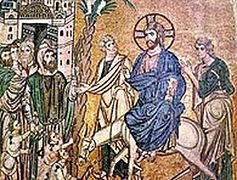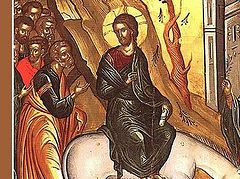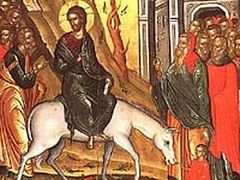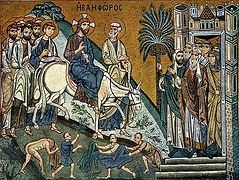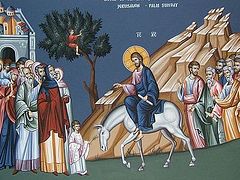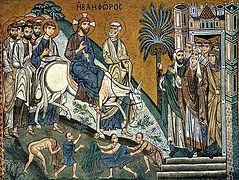Jerusalem was all astir with the news about the exceedingly great miracle of the resurrection of Lazarus the four-days-dead by the Lord Jesus Christ.
They needed to greet with glory this Miracle Worker, the likes of whom the world had never seen before, Who had worked this unprecedented miracle.
The people were under submission to the Romans, and therefore could not prepare an exorbitant triumphal greeting; furthermore the Lord Jesus’s entrance into Jerusalem bore an entirely different stamp from the triumphal celebrations of the Roman emperors and commanders. This holy stamp was foretold hundreds of years before, by the prophet Zacharias, who said, Rejoice greatly, O daughter Sion! Behold, your king comes to you, just and salvific is he, meek and riding on a beast of burden and a young foal (Zach. 9:9)
The people spread out their clothing upon the road before Jesus, waving palm branches, and proclaiming in their exaltation, Hosanna in the highest! Blessed is the King that cometh in the name of the Lord! Peace in heaven, and glory in the highest!
Our Lord Jesus Christ was met not as a king of earthly glory, but as a spiritual King. They shouted to Him, “Hosanna!”, which means “save us”. They saw in Him a Savior and leader toward higher glory.
It would seem that joy should have filled the Lord Jesus’s heart, but when He looked upon Jerusalem from the hillside He wept, and abundant tears streamed down His cheeks. He, the omniscient Son of God, knew that the unfaithful Jewish people would, in only five days, shout before Pontius Pilate, Crucify Him!
Before His spiritual eyes unfolded a terrible picture of the very harsh punishment to which His Heavenly Father would subject this stiff-necked and faithless nation for murdering Him. He saw the indescribable horrors of the attack and destruction of Jerusalem by the Roman commanders Vespasian and Titus, and in tears He said, If thou hadst known, even thou, at least in this thy day, the things which belong unto thy peace! but now they are hid from thine eyes. For the days shall come upon thee, that thine enemies shall cast a trench about thee, and compass thee round, and keep thee in on every side, and shall lay thee even with the ground, and thy children within thee; and they shall not leave in thee one stone upon another; because thou knewest not the time of thy visitation (Lk. 19:42-44).
Has it ever been seen that a king being greeted triumphantly by the people should shed tears? And Jesus was being met precisely as a king.
Fear and rancor filled the hearts of His enemies, and they said to Jesus, Master, rebuke Thy disciples. They did not understand that if the disciples would be silent, then the stones would cry out, as Jesus said to them.
They came to the temple in Jerusalem, and suddenly Jesus’s weeping and meek heart was filled with royal wrath. How did they dare to defile His temple with the sale of animals and money changing?! He cast out the merchants from the temple and overturned money changers’ tables.
But then a crowd of the sick and suffering surrounded Him. And again His wrath was changed to meekness and mercy—and He healed them all. His entrance into Jerusalem ended with this act of mercy.
In reverence and holy exaltation let us bow our heads before our Savior and King. May we never forget His words directed at Jerusalem: If thou hadst known, even thou, at least in this thy day, the things which belong unto thy peace!
Let us also not forget His sacred wrath that replaced His tears, and think about whether this may be a lesson also for us, among whom we find no few stiff-necked.
Aren’t there in the life of our days also many visitations of God, which we do not notice, or do not admit that they serve for our peace and salvation?
The days of our visitation by the Holy Spirit are manifold and diverse. When it is necessary to stop us on our crooked path, He does so with a serious illness; He shakes us with the death of close and beloved people, subjects us to dishonor, or the destruction of our property; He humbles our pride with public humiliation and insult. He even stops those who are worthier and closer to Him with His quiet speech, both in dreams and in person.
Aren’t these the days of His visitation to us, which serve for our peace and salvation?! And how often, instead of correcting our ways do we murmur against God for these visitations! This is the first lesson for us.
The second lesson the Lord gives us by casting out the merchants consists in the fact that even in times of deep sorrow and bitter tears, we must suddenly burst into wrath if we see or hear the defiling of sacred things.
Then our sorrow should suddenly be replaced by sacred wrath, and without thinking about any dangers, even danger to our lives, we should bravely and fearlessly stand in defense of sacred things.
But does it often happen this way? Doesn’t it much more often happen that base faintheartedness overcomes us, and we do not dare say a word to the audacious blasphemers and mockers?
May the great day of the Entrance of the Lord into Jerusalem remind us of His tears and sacred wrath, that we might never forget His bitter tears and words, directed not only to Jerusalem, but also to each one of us!
Let us place it as a goal of our life to follow Christ, for He Himself said, If any man serve me, let him follow me; and where I am, there shall also my servant be (Jn. 12:26).
Let us follow Christ, through the straight gate and narrow way—and we shall find rest in the place where shines the eternal glory of the Holy Trinity.
Amen.
(April 18, 1954)


